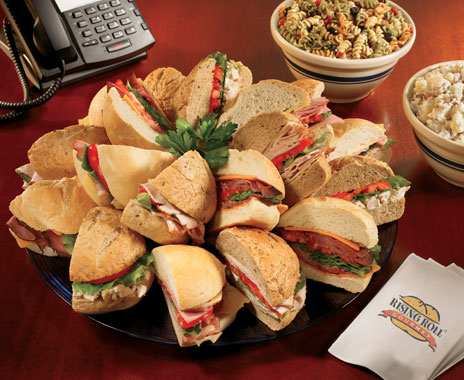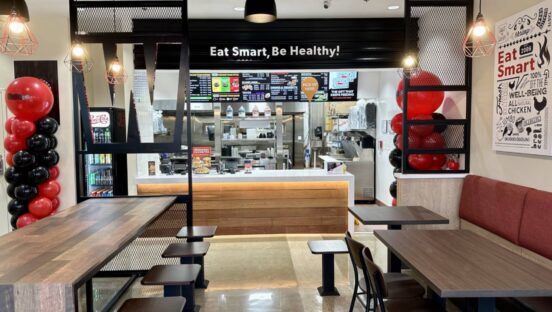Rising Roll Gourmet Café has all the makings of a widespread, national restaurant chain. That isn’t conjecture; it’s the words of a fast food CEO turned consultant for a day.
“He wanted to know, ‘Why aren’t you growing faster?’” says Rising Roll CEO Mike Lassiter. “And our response back to that was, ‘It’s never been about the numbers. This isn’t a numbers game for us.’”
While that sentiment isn’t about to change, those unit counts just might. This year, Rising Roll launched its first national campaign aimed at potential franchisees.
The 19-unit brand debuted in 1999 under the name Uptown Gourmet and began franchising four years later. But the marketing material was restrained to in-store signage.
What changed?
Lassiter, who became the company’s top executive in 2007 when he purchased it from the original founders, says Rising Roll had to effectively position itself first. They did so by diving into non-traditional real estate.
Venues such as university campuses, medical centers, and Class A office buildings became Rising Roll’s focus out of the franchising gate. It clearly worked—16 of its 19 stores are located in such outlets. From a strictly profitable standpoint, the strategy was a hit, Lassiter says. But it had its drawbacks.
“It took us off the map a little bit because non-traditional stores don’t really get the exposure of retail stores as far as growth is concerned,” he says.
Before shifting gears, however, Lassiter wanted to make sure Rising Roll was ready to scale. In 2014, the chain hired a firm to examine all aspects of the concept. First to go: the animated sandwich logo, which simply didn’t line up with Rising Roll’s quality-driven mantra.
The brand launched a new website, logo (it’s now three circles, one with a sandwich, one with silverware, and another with a harvest image), and began to reimage stores as well. Rising Roll’s name had already been through the ringer. When the concept initially decided to franchise, it realized that Uptown Gourmet was taken by multiple restaurants. A marketing team came in and presented the team with 200 alternatives.
The concept launched as Rising Roll Sandwich Company. Right away it felt too industrial, Lassiter says. Then came Rising Roll Gourmet, which confused guests.
“OK, are you cinnamon rolls? Are you sushi? What is your brand,” Lassiter says. “So when we really looked at our menu, it fits into that gourmet/café category. And so the name shifted to Rising Roll Gourmet Café.”
That final moniker stuck. With the branding and look aligned, Lassiter says the chain “feels really good about where we are now.”
He’s hoping for five deals in 2017 and 10 in 2018. If that happens, the company will nearly double in size, opening a floodgate for future growth.
Lassiter took the brand to a show in Las Vegas recently where he interacted with the chain’s target operator. They’re launching an area representative program where Rising Roll will sell territories to individuals who can develop stores and share in the franchisee fees and royalties.
This process is something Lassiter is intimate with. Back in 1991 he developed 85 restaurants for Schlotzsky’s along the same path.
Just because the brand is targeting retail spots, though, doesn’t mean it’s ready to abandon non-traditional, Lassiter says.
“Our non-traditional is going to continue to grow. We’ve got more universities in the pipelines,” he says. “We’ve got more Class A office buildings where we’ve kind of built a niche. Where these developers are coming to us saying we want your brand in there, you’re the best at what you do. In these high-rise buildings we’re getting a lot of opportunities to grow in that arena. But it’s the retail segment where we really want to get back into with our growth.”
There are some aspects of Rising Roll that will change as its surroundings do. For example, its 12-foot deli case, where guests can see the made-from-scratch product on display, won’t make it in retail venues. It will be scaled to an 8-foot case, and in some stores, there won’t be one at all. Diners will come in, walk to the register, and order. That hasn’t been the model in the past.
“We’re going to go ahead and test that as well corporately. And just see if that helps with throughput,” Lassiter says.
A 12-foot deli case tends to result in a very long service line, which can be troublesome depending on the space. “We’re excited about trying [something new]. We think it takes an important design element away but once they have the food they will know how gourmet it is,” he says.
Rising Roll is planning to add two corporate stores, which is another departure from its previous strategy. There is currently one company unit. “In the past we have focused on not owning stores but serving our franchisees. Our priority was not making sure we have staffing in place and dealing with the challenges of the restaurant industry; it was being there for our franchisees. Helping them get better at operations and putting them in the best position to be successful,” he says.
The corporate stores, however, will serve as valuable testing grounds moving forward. Rising Roll will then sell the locations to franchisees once they’re proven. “We’re not going to ask a franchisee to try new concept stores for us. That’s our responsibility,” Lassiter says.
Rising Roll has been self funded since day one and has “never borrowed a dime.” Lassister says it will stay that way for the foreseeable future.
The growth, he adds, will come on the back of Rising Roll’s menu and penchant for product innovation. Having non-traditional stores, especially the five campus locations (South Florida, University of Virginia, University of Florida, Kentucky, and Florida State) has helped keep the culinary team thinking ahead.
“We have some of the classic food. Like chicken salad, potato salad, and cole slaw. But that’s stuff your grandmother makes. We really had to focus on bringing in some really cool things for the millennials,” he says.
The menu has about 50 choices broken down into multiple categories: gourmet sandwiches, hot sandwiches, wraps, salads, and breakfast. There are gluten-reduced, vegan, and under-400 calorie options as well.
Some signature choices include: Curry Chicken Salad, Firecracker Chicken, Turkey & Pear with Goat Cheese, and Pimento Cheese & Apple.
Lassiter says the company will focus on its core Southeast audience but is really just looking for that right operator, whether it’s in Colorado or in the chain’s Atlanta base.
“It’s good to be back. I think people are going to see us around. We were purposely flying under the radar screen but we’ve made the improvements to the brand that needed to happen and we’re ready to roll it out. We’re real excited,” he says.






